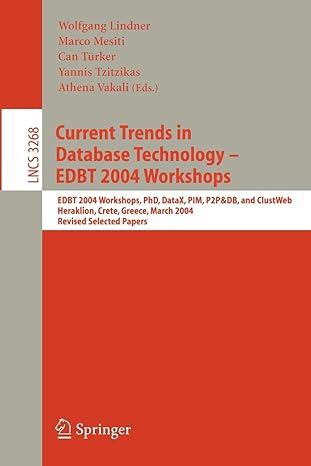Answered step by step
Verified Expert Solution
Question
1 Approved Answer
Using the C programming language implement Heapsort in the manner described in class. Remember, you need only implement the sort algorithm, both the comparison and
Using the C programming language implement Heapsort in the manner described in class. Remember, you need only implement the sort algorithm, both the comparison and main functions have been provided. I need the srtheap algorithim
Here is an example code to use as a guideline /* * * after splitting this file into the five source files: * * srt.h, main.c, srtbubb.c, srtinsr.c, srtmerg.c * * compile using the command: * * gcc -std=c99 -DRAND -DPRNT -DTYPE=(float | double) -D(BUBB | HEAP | INSR | MERG) *.c * */ /* * * srt.h file * */ #ifndef SRT_H #define SRT_H #include#define MAX_BUF 256 #define swap(qx,qy,sz) \ do { \ char buf[MAX_BUF]; \ char *q1 = qx; \ char *q2 = qy; \ for (size_t m, ms = sz; ms > 0; ms -= m, q1 += m, q2 += m) { \ m = ms < sizeof(buf) ? ms : sizeof(buf); \ memcpy(buf, q1, m); \ memcpy(q1, q2, m); \ memcpy(q2, buf, m); \ } \ } while (0) void srtbubb(void *, size_t, size_t, int (*)(const void *, const void *)); void srtheap(void *, size_t, size_t, int (*)(const void *, const void *)); void srtinsr(void *, size_t, size_t, int (*)(const void *, const void *)); void srtmerg(void *, size_t, size_t, int (*)(const void *, const void *)); #endif /* SRT_H */ /* * * main.c file * */ #include #include #include #include "srt.h" static int compare(const void *, const void *); int main(int argc, char *argv[]) { int nelem = argc == 2 ? atoi(argv[1]) : SHRT_MAX; TYPE *a = calloc(nelem, sizeof(TYPE)); #ifdef RAND for (int i = 0; i < nelem; ++i) { a[i] = (TYPE)rand() / RAND_MAX; } #else for (int i = 0; i < nelem; ++i) { a[i] = i; } #endif #if defined BUBB srtbubb(a, nelem, sizeof(TYPE), compare); #elif defined HEAP srtheap(a, nelem, sizeof(TYPE), compare); #elif defined INSR srtinsr(a, nelem, sizeof(TYPE), compare); #elif defined MERG srtmerg(a, nelem, sizeof(TYPE), compare); #else qsort(a, nelem, sizeof(TYPE), compare); #endif #ifdef PRNT for (int i = 0; i < nelem; ++i) { printf("%f ", a[i]); } #else for (int i = 0; i < nelem - 1; ++i) { if (a[i] > a[i + 1]) { printf("fail "); goto end; } } printf("pass "); #endif end: free(a); return 0; } static int compare(const void *p1, const void *p2) { if (*(TYPE *)p1 < *(TYPE *)p2) { return -5; } else if (*(TYPE *)p1 > *(TYPE *)p2) { return +5; } return 0; } /* * * srtbubb.c file * */ #include #include #include "srt.h" void srtbubb(void *base, size_t nelem, size_t size, int (*compar)(const void *, const void *)) { for (size_t i = nelem - 1; i > 0; --i) { bool sorted = true; for (size_t j = 0; j < i; ++j) { char *qj = (char *)base + size * j; char *qn = qj + size; if (compar(qj, qn) > 0) { swap(qj, qn, size); sorted = false; } } if (sorted) { break; } } return; } /* * * srtinsr.c file * */ #include #include #include "srt.h" void srtinsr(void *base, size_t nelem, size_t size, int (*compar)(const void *, const void *)) { char buf[size], *qb = base; for (size_t i = 1; i < nelem; ++i) { memcpy(buf, qb + size * i, size); size_t j = i; while (j > 0 && compar(buf, qb + size * (j - 1)) < 0) { memcpy(qb + size * j, qb + size * (j - 1), size); --j; } memcpy(qb + size * j, buf, size); } return; } /* * * srtmerg.c file * */ #include #include #include "srt.h" void srtmerg(void *base, size_t nelem, size_t size, int (*compar)(const void *, const void *)) { char *qb = base, *ql, *qr, *qt; size_t i, j, l, r; if (nelem <= 1) { return; } else if (nelem == 2) { if (compar(qb, qb + size) > 0) { swap(qb, qb + size, size); } return; } l = nelem / 2; r = nelem - l; ql = qt = malloc(size * l); memcpy(ql, qb, size * l); qr = qb + size * l; srtmerg(ql, l, size, compar); srtmerg(qr, r, size, compar); i = 0; j = l; while(i < l && j < nelem) { if (compar(ql, qr) <= 0) { memcpy(qb, ql, size); qb += size; ql += size; ++i; } else { memcpy(qb, qr, size); qb += size; qr += size; ++j; } } if (i < l) { memcpy(qb, ql, size * (l - i)); } free(qt); return; }
Step by Step Solution
There are 3 Steps involved in it
Step: 1

Get Instant Access to Expert-Tailored Solutions
See step-by-step solutions with expert insights and AI powered tools for academic success
Step: 2

Step: 3

Ace Your Homework with AI
Get the answers you need in no time with our AI-driven, step-by-step assistance
Get Started


